- Home
- Sherry Thomas
A Conspiracy in Belgravia
A Conspiracy in Belgravia Read online
PRAISE FOR
A Study in Scarlet Women
AN NPR BEST BOOK OF 2016
“Thomas’s use of language, the way she uses gender reversal to conceal revelations, and the intricacies of her plotting mean that I will rediscover more things to relish in A Study in Scarlet Women each time I reread it.”
—NPR.com
“From the carefully plotted twists to the elegant turns of phrase, A Study in Scarlet Women is a splendid addition to Holmes’s world.”
—Deanna Raybourn, New York Times bestselling author of A Perilous Undertaking
“Sherry Thomas is a master of her craft.”
—Tasha Alexander, New York Times bestselling author of A Terrible Beauty
“Clever historical details and a top-shelf mystery add to the winning appeal of this first volume in the Lady Sherlock series. A must-read for fans of historical mysteries.”
—Library Journal (starred review)
“A completely new, brilliantly conceived take on the iconic detective . . . A plot worthy of [Sir Arthur Conan Doyle] at his best.”
—Booklist
“Readers will wait with bated breath to discover how Thomas will skillfully weave in each aspect of the Sherlockian canon, and devour the pages to learn how the mystery unfolds.”
—Anna Lee Huber, national bestselling author of the Lady Darby Mysteries
“The various characters introduced are quite interesting and the plotlines are great. This is the first in the new Lady Sherlock series, and if this is any clue, Charlotte and her continuing adventures will be thrilling to read.”
—Suspense Magazine
Also by Sherry Thomas
The Lady Sherlock Series
A STUDY IN SCARLET WOMEN
MY BEAUTIFUL ENEMY
THE LUCKIEST LADY IN LONDON
TEMPTING THE BRIDE
RAVISHING THE HEIRESS
BEGUILING THE BEAUTY
HIS AT NIGHT
NOT QUITE A HUSBAND
DELICIOUS
PRIVATE ARRANGEMENTS
BERKLEY
An imprint of Penguin Random House LLC
375 Hudson Street, New York, New York 10014
Copyright © 2017 by Sherry Thomas
Penguin Random House supports copyright. Copyright fuels creativity, encourages diverse voices, promotes free speech, and creates a vibrant culture. Thank you for buying an authorized edition of this book and for complying with copyright laws by not reproducing, scanning, or distributing any part of it in any form without permission. You are supporting writers and allowing Penguin Random House to continue to publish books for every reader.
BERKLEY is a registered trademark and the B colophon is a trademark of Penguin Random House LLC.
Library of Congress Cataloging-in-Publication Data
Names: Thomas, Sherry (Sherry M.), author.
Title: A conspiracy in Belgravia / Sherry Thomas.
Description: First edition. | New York : Berkley, 2017. | Series: The Lady Sherlock series ; 2
Identifiers: LCCN 2017024223 (print) | LCCN 2017027874 (ebook) | ISBN 9780698196360 (ebook) | ISBN 9780425281413 (softcover)
Subjects: LCSH: Women private investigators—England—London—Fiction. | GSAFD: Mystery fiction. | Historical fiction.
Classification: LCC PS3620.H6426 (ebook) | LCC PS3620.H6426 C66 2017 (print) | DDC 813/.6—dc23
LC record available at https://lccn.loc.gov/2017024223
First Edition: September 2017
Cover art: photo of woman © Ilina Simeonova; foggy background © Joana Kruse
This is a work of fiction. Names, characters, places, and incidents either are the product of the author’s imagination or are used fictitiously, and any resemblance to actual persons, living or dead, business establishments, events, or locales is entirely coincidental.
Version_1
To Kerry, who has been a true champion for these books
CONTENTS
Praise for A Study in Scarlet Women
Also by Sherry Thomas
Title Page
Copyright
Dedication
Prologue
Chapter One
Chapter Two
Chapter Three
Chapter Four
Chapter Five
Chapter Six
Chapter Seven
Chapter Eight
Chapter Nine
Chapter Ten
Chapter Eleven
Chapter Twelve
Chapter Thirteen
Chapter Fourteen
Chapter Fifteen
Chapter Sixteen
Chapter Seventeen
Chapter Eighteen
Chapter Nineteen
Chapter Twenty
Chapter Twenty-one
Chapter Twenty-two
Acknowledgments
About the Author
Prologue
Thank goodness for a blatantly obvious murder.
Inspector Treadles did not say those words aloud—that would be disrespectful to the deceased. But he most certainly entertained the thought as he made his way, Sergeant MacDonald in tow, to the house where the body had been found.
After the taxing irregularities of the Sackville case, a run-of-the-mill murder would be calming and restorative. He looked forward to gathering clues. He looked forward to questioning witnesses. He looked forward to assembling an account that would serve as the crown’s evidence.
He looked forward to handling every aspect of the work on his own, without needing to turn to anyone else for help.
The district was unexciting, the streets without character, the houses unimpeachable in their blandness. Inspector Treadles was beginning to like this case more and more, even as in the back of his mind, a voice whispered that it was all he was good for: the utterly ordinary. The cases that required only dull, plodding work.
Grimly he pushed the thoughts away. They were for the small hours of the night. At the moment his time and his mind belonged to the business of the Criminal Investigation Department. And he would show his superiors that with or without Sherlock Holmes, he was a capable and effective man, an asset to any police force.
“That’s the place ahead,” said Sergeant MacDonald.
They were on a street that could have come from anywhere in the ring of suburbs that surrounded London: macadam lane, two- and three-story brown-brick buildings, a newsagent’s at one end and a pub at the other. A constable had been stationed at the murder site, outside the front door. As they approached, curtains fluttered in nearby houses.
A hackney drove past and came to a stop. A man alit.
“Is that . . .” murmured Sergeant MacDonald.
It was. Lord Ingram, Inspector Treadles’s esteemed friend—a little less esteemed these days, perhaps, given his association with “Sherlock Holmes.”
Lord Ingram stood by the side of the hackney and helped a lady descend. No, not a lady, a fallen woman, one who had never seemed remotely bashful of either her past or her present.
They saw Treadles, exchanged a glance with each other, and came toward him.
“Inspector, Sergeant, how unexpected,” said Lord Ingram. “Trouble in these parts?”
Treadles noticed that his friend was less warm than usual in his greeting. Had he read the tension in Treadles’s jaw and deduced his discomfort in the presence of Miss Charlotte Holmes? It was natural that as a friend to both, he might feel himself constraine
d. But Treadles couldn’t help a sense of injury, a feeling deep down that Lord Ingram would choose Miss Holmes over him any day of the week.
“I’m afraid I’m not at liberty to discuss police matters,” he said, hating the stiffness of his voice.
A tall, red-faced man emerged from the house. “Ah, Inspector Treadles,” he said loudly. “You are here. The body’s inside and it’s not pretty.”
“Let me not keep you from your work.” Lord Ingram nodded. “Inspector, Sergeant, good day.”
He and Miss Holmes returned to the hackney and drove away. Inspector Treadles stared after them. He had no idea how they had learned of the crime when he himself had been informed less than an hour ago, but he had a presentiment that their involvement in the matter was only beginning.
And he did not like it.
One
SUNDAY
SIX DAYS EARLIER . . .
This is an account of a remarkable man named Sherlock Holmes.
No, no, too unremarkable an opening. Miss Olivia Holmes scratched out the line.
Let me recount a tale of woe and vengeance.
Better, maybe. At least a little more intriguing.
The origin of our story lies decades ago, in a paroxysm of violence and betrayal. Let your mind leap over the tumult of the Atlantic Ocean into the vastness of the New World. Past the cities on the East Coast of the continent, past the farms and homesteads of its tamer interior regions. Now you have come to the edge of the frontier. The land beyond is harsh; survival is uncertain. But you have come too far. You have no choice but to forge ahead.
Livia tapped the end of her pen against her lower lip. This was a fair enough beginning, if she did say so herself. The setting was clear. The sentences were muscular. And when she read the whole thing aloud—as all good stories should be—she detected a pleasing cadence to the syllables.
Was it possible she could actually do it, compose an engrossing story inspired by the feats of her sister Charlotte?
The day before, Charlotte had assured her that she was fully worthy of the task. Livia hadn’t been able to sleep a wink. As she’d stared at the dark ceiling, the story had come to her in flashes: a grassy, mountain-ringed oasis in an arid, hostile landscape, a wagon train laden with weary yet hopeful families headed for California, a massacre brewing in the hearts of Utah Territory militiamen who feared persecution and loathed outsiders.
If she did manage to give birth to this story, it could very well go on to be featured in a respected and widely read publication. How gratifying would it be, from her neglected corner in whichever Society drawing room, to hear those guests who never had any use for her discuss her narrative with astonished admiration.
Livia imagined the warm satisfaction she would feel, a snug, enduring sense of well-being.
She took a bite of bacon and consulted the travel handbook she’d borrowed from the circulating library. It was imperative that she give a correct description of Utah. Inaccuracies on the part of Sherlock Holmes’s chronicler could diminish readers’ opinion of the great detective, and she must not let that happen.
The problem was, she also couldn’t paint too complete a picture, as even the handbook only offered patchy information. She would have to be vague about the exact location of her setting—somehow cobbling together one or two descriptive paragraphs—then pivot onto the doings of her characters.
Except she didn’t know yet who those characters ought to be. The victim would be a girl—that much was clear. But what about the eventual avenger who swooped in decades later to punish the culprits? Would that person be a woman or a man? And those culprits, who were they?
According to Mr. Mark Twain, whose account of the Mountain Meadows Massacre first gave her the idea of a story of vengeance, nine men were indicted afterward, but only one was tried in a court of law. Those who escaped justice, naturally, made for good targets for a vigilant avenger. But eight targets were too many—two or three seemed more reasonable.
Did that mean she also had to reduce the scale of the massacre to account for the smaller number of killers? Or would it be all right to say more of them had been lawfully punished? According to the records, only children younger than seven were spared—and taken in by nearby families. If her avenger was one of those children, it would add an entire other dimension of complication to the story. Could an older child, an adolescent perhaps, have crawled away during the night and escaped?
Livia rubbed her temples. Now she remembered why she never proceeded beyond a few pages in any story: too many decisions to make. Often she wished that her life weren’t so constricted, that she could make more of her own choices. But staring at the still largely empty sheet of paper before her, she was reminded that no, Charlotte was the one who wanted to make her own decisions. She, Livia, merely wished the world would be served up on a platter, cut to bite size and seasoned exactly to her liking.
A housemaid entered the breakfast parlor. Livia slammed her notebook shut. But the maid only set an ironed copy of the paper on the table and left silently.
Livia swore under her breath. Why was she always so jumpy? Why couldn’t she be calm and majestic instead?
She reached for the paper. More specifically, the small notices at the back of the paper. She especially enjoyed the ones in code, secret transmissions between lovers who didn’t dare communicate openly.
The code they employed tended to be simple letter substitutions, frequently no more complicated than shifting the entire alphabet one letter over. Some aspired to a bit of sophistication. A series of notices that started a few days ago, for example, had taken the extra step of converting already substituted letters to numbers, according to where they stood in the alphabet.
A rather distressing set of messages they were, too, a discarded lover dispiritedly yet doggedly trying to get a response from the faithless beloved.
Or at least that was how Livia interpreted the messages. She didn’t believe the sender would receive the hoped-for response, but she couldn’t help but check each morning to find out whether the unrequited transmissions were still ongoing.
She almost didn’t see her sister’s nom de guerre in print. But something made her glance back at the columns of newsprint she had skipped.
STRANGE NOISES IN THE ATTIC? THERE IS ALWAYS SHERLOCK HOLMES
In June of this year the death of the Honorable Harrington Sackville brought to notice one Mr. Sherlock Holmes, self-styled consultant to the Metropolitan Police. Since then, Mr. Holmes has made his services available to the public. Which leads to that most reasonable question: What exactly has he done for the man on the street—or, for that matter, the lady in the parlor?
One gentleman, Mr. S_______, enthused that Mr. Holmes helped him decipher clues from his beloved concerning her birthday present. A lady, Mrs. O_______, claimed that Mr. Holmes located her lost ring. A trio of elderly sisters declared he was instrumental in easing their minds concerning mysterious noises in the attic, which did not emanate from spirits communing via Morse code, but wood-boring insects carrying out their daily routines.
When asked about Mr. Holmes’s overwhelmingly domestic private consultations, an official at Scotland Yard answered, “How Sherlock Holmes chooses to spend his time is not the Metropolitan Police’s concern.” The same official refused comment on whether Scotland Yard would seek Mr. Holmes’s assistance in the future, except to note that his advice is not needed on any current cases.
After an exciting arrival on the scene, has Sherlock Holmes’s great promise already faded into the tedium of uncovering household curiosities? Thunderous murders to the life cycle of deathwatch beetles?
Only time will tell.
“Oh, what drivel!” exclaimed Penelope Redmayne, as she finished reading the newspaper article aloud.
“I concur,” said her aunt, Mrs. John Watson, the lady of the house.
They both looked towa
rd the third occupant of the table, a young woman in her midtwenties. She wore a dusky pink day dress with a ruffled collar of starched white eyelet lace, which perfectly set off her shiny blond curls, large blue eyes, and generous lips. The same lace, in three tiers, also fell from her cuffs, the trailing edge of which brushed against the tablecloth as she spread a pat of butter on a freshly baked muffin.
She did it with great concentration—Miss Charlotte Holmes, Mrs. Watson had realized from the very beginning, took her food seriously. In fact, given her pleasantly plump form and the suggestion of a second chin—her features were lovely but her face would never be praised for its bone structure—one might easily suppose that Miss Holmes thought of nothing else except her meals.
Miss Holmes took a bite of her muffin, her expression intense with pleasure. But when she spoke, her voice was cool and measured. “I enjoyed the article. The timing is good—we will not need to spend on advertisement this fortnight. And frankly, the writer’s thrust is no less advantageous to our interests. Household curiosities are the backbone of our enterprise. There must be a number of men on the street—and ladies in the parlor—who have decided against consulting Sherlock Holmes because they chiefly know him as someone who advises Scotland Yard on murders. Now that they understand Holmes is happy to help with domestic oddities, they are more likely to come forward.”
She glanced down at the muffin, as if debating whether to drench it with even more butter. The term Maximum Tolerable Chins popped into Mrs. Watson’s head—it had come up the first time they sat down at the table together, the benchmark for whether Miss Holmes ate as she wished or gave in to the lamentable necessity to curb her appetite.
With visible regret Miss Holmes set down her butter knife. “Besides, I think highly of uncovering household curiosities. They remunerate well and do not endanger anyone.”
“Hear, hear!” said Penelope cheerfully.
Mrs. Watson flattened her lips. “I still do not like the snide tone of the article.”

_preview.jpg) Claiming the Duchess (Fitzhugh Trilogy Book 0.5)
Claiming the Duchess (Fitzhugh Trilogy Book 0.5)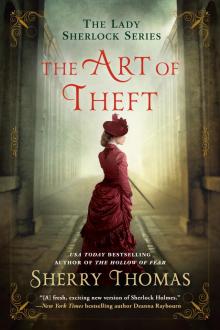 The Art of Theft
The Art of Theft The Magnolia Sword: A Ballad of Mulan
The Magnolia Sword: A Ballad of Mulan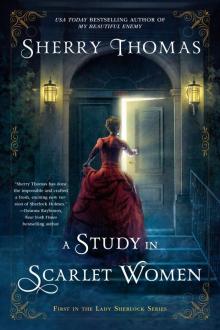 A Study In Scarlet Women
A Study In Scarlet Women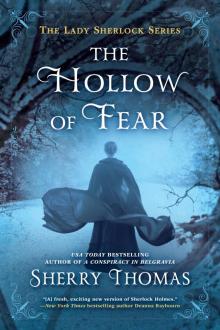 The Hollow of Fear
The Hollow of Fear The Magnolia Sword
The Magnolia Sword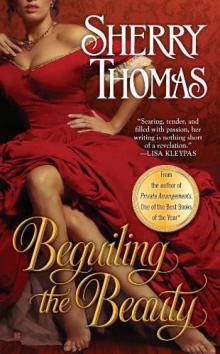 Beguiling the Beauty ft-1
Beguiling the Beauty ft-1 The Heart is a Universe
The Heart is a Universe The Hidden Blade: A Prequel to My Beautiful Enemy (Heart of Blade)
The Hidden Blade: A Prequel to My Beautiful Enemy (Heart of Blade)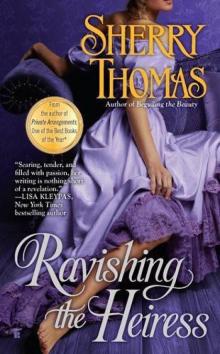 Ravishing the Heiress ft-2
Ravishing the Heiress ft-2 The Immortal Heights
The Immortal Heights The Hidden Blade
The Hidden Blade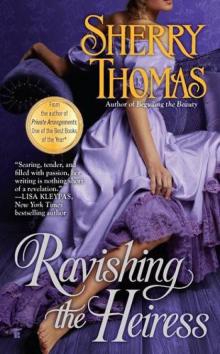 Ravishing the Heiress
Ravishing the Heiress Tempting the Bride
Tempting the Bride The Luckiest Lady in London
The Luckiest Lady in London The Bride of Larkspear: A Fitzhugh Trilogy Erotic Novella
The Bride of Larkspear: A Fitzhugh Trilogy Erotic Novella Claiming the Duchess
Claiming the Duchess The One in My Heart
The One in My Heart His At Night
His At Night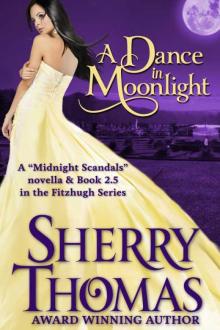 A Dance in Moonlight
A Dance in Moonlight A Conspiracy in Belgravia
A Conspiracy in Belgravia Not Quite a Husband
Not Quite a Husband